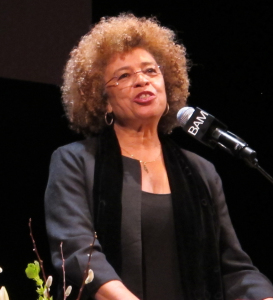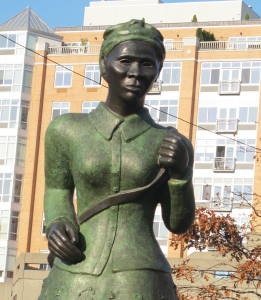
My Sheroes, by Carrie Stewart,
Guest writer (in honor of Women’s History Month)
My sheroes are all part of the Civil Rights movement. I was fortunate as a white person to have a family that encouraged me to be involved and support Civil Rights activities. The movement was my American Studies thesis topic as a Smith College grad in 1981. I have been re-inspired to activism about voting rights, police brutality and the call for white anti-racist engagement. I participate in many justice conferences and recently marched across the Edmund Pettus Bridge in Selma, Alabama to commemorate the 50th anniversary of Bloody Sunday. Here is my list of sheroes whose work and lives have impacted me most.

1. Harriett Tubman – abolitionist, suffragist and activist who escaped slavery. She courageously conducted the Underground Railroad by returning to slave states to rescue other enslaved people. She saved lives by taking serous risks of being re-enslaved and brutally injured.
2. Ella Baker – was probably the most influential and unsung black woman of the civil rights era. Baker helped found the Mississippi Democratic Party as an alternative to the all-white Mississippi Democratic Party. Click here for more.
3. Amelia Boynton – was the first black woman to run for US Congress from Alabama. She led demonstrations for civil rights and voting rights in Selma. She was beaten unconscious on Bloody Sunday. It was her famous photo that became an emblem of the brutality of that day in Selma.
4. Barbara Jordan – was a woman of many firsts: the first black woman elected to the Texas Senate since Reconstruction; first Southern black woman elected to the US Congress, she served on the influential House Judiciary Committee during the impeachment of President Richard Nixon; first black woman to make the keynote speech at the Democratic National Convention; and the first black woman to be buried in the Texas State Cemetery.
5. Marian Wright Edelman – founder and executive director of the Children’s Defense Fund, the largest and most consistent voice for disadvantaged children since 1973. She was also a powerful lawyer who worked for the NAACP Legal Defense Fund and helped found Mississippi Freedom Summer in 1964.
6. bell hooks – feminist professor, author and critic of the white supremacist capitalist patriarchy. Her insights into oppressive structures are key to understanding postmodern perspective.
7. Angela Davis – feminist and African American studies professor, and abolitionist of the prison-industrial complex. She was among the more radical and outspoken black women voices of the Civil Rights era.
8. Alice Walker – activist and a Pulitzer Prize and National Book Award winning author of The Color Purple, a novel that became a Broadway production and Hollywood film.
9. Michelle Alexander – civil rights attorney, law professor and author of The New Jim Crow: Mass Incarceration in the Age of Colorblindness. This singular book alerted us all about today’s US racist caste system that has eroded constitutional protections for people of color by making them second-class citizens.
10. Opal Tometi – Black Alliance for Just Immigration executive director and one of the co-founders of #BlackLivesMatter. This young woman is helping to re-build the black liberation movement with a vision of radical inclusivity. She wants to leave no one behind.

(Carrie Stewart is the Owner/Principal of One World Consulting & Diversity Training.)
(photos by Sylvia Wong Lewis-Harriet Tubman statue in Harlem park by artist Alison Saar; Angela Davis photographed at Martin Luther King event at Brooklyn Academy of Music.)